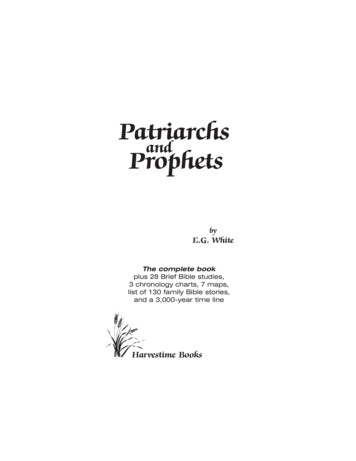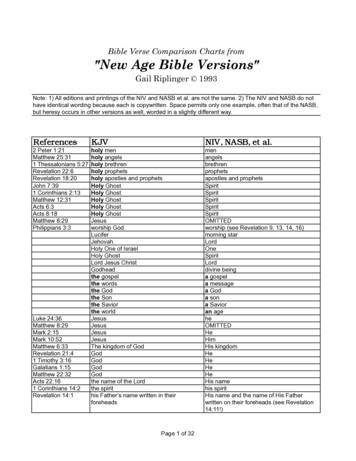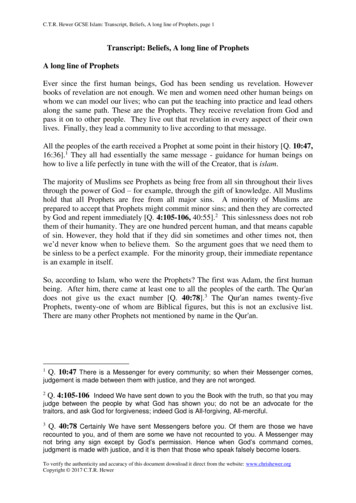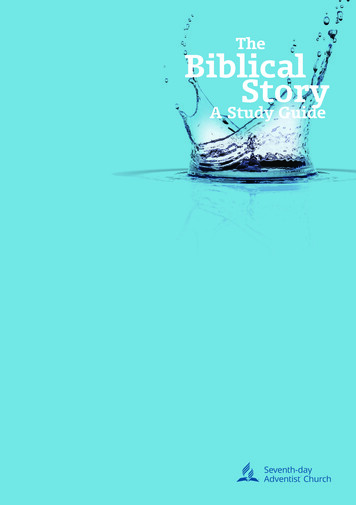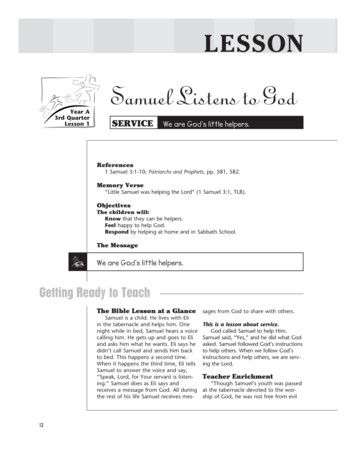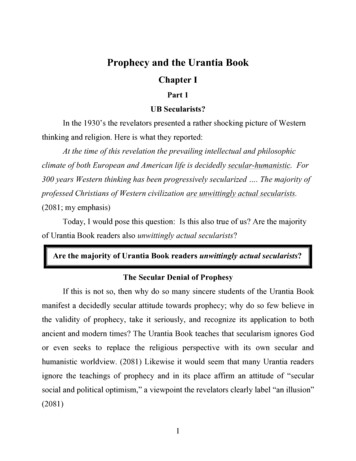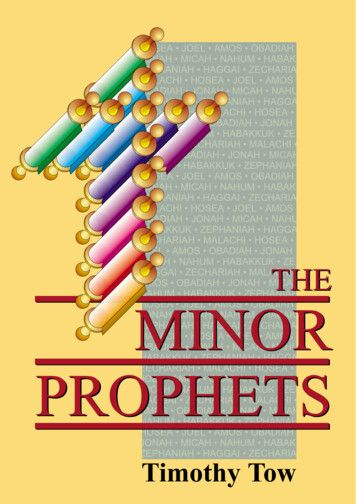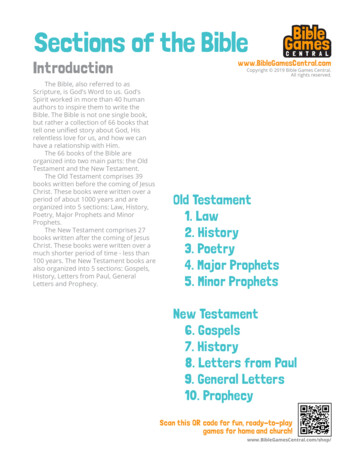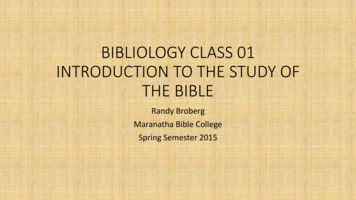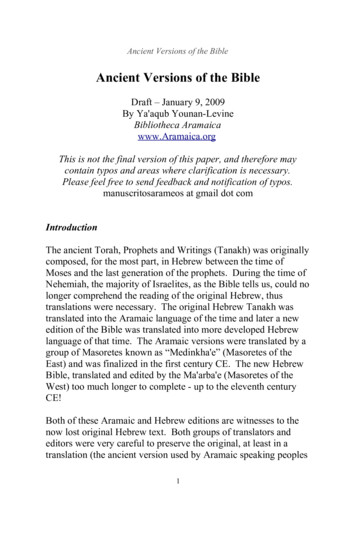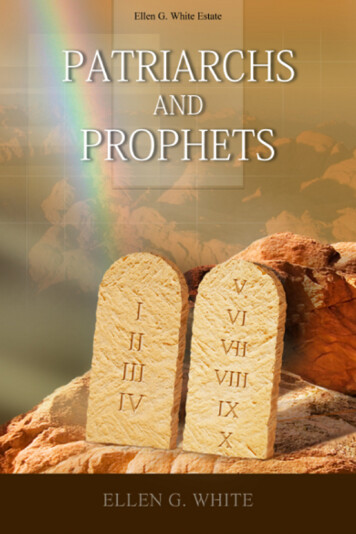
Transcription
Patriarchs and ProphetsEllen G. White1890
Information about this BookOverviewThis ePub publication is provided as a service of the Ellen G. White Estate. Itis part of a larger collection. Please visit the Ellen G. White Estate website for acomplete list of available publications.About the AuthorEllen G. White (1827-1915) is considered the most widely translated Americanauthor, her works having been published in more than 160 languages. She wrote morethan 100,000 pages on a wide variety of spiritual and practical topics. Guided by theHoly Spirit, she exalted Jesus and pointed to the Scriptures as the basis of one’s faith.Further LinksA Brief Biography of Ellen G. WhiteAbout the Ellen G. White EstateEnd User License AgreementThe viewing, printing or downloading of this book grants you only a limited,nonexclusive and nontransferable license for use solely by you for your own personaluse. This license does not permit republication, distribution, assignment, sublicense,sale, preparation of derivative works, or other use. Any unauthorized use of this bookterminates the license granted hereby. Copyright 2010 by the Ellen G. White Estate, Inc.For more information about the author, publishers, or how you can support thisservice, please contact the Ellen G. White Estate: (email address). We are thankful foryour interest and feedback and wish you God’s blessing as you read.
PrefaceThe publishers send out this work from a conviction that it throws light upon asubject of paramount importance and universal interest, and one on which light is tobe greatly desired; that it presents truths too little known or too widely ignored. Thegreat controversy between truth and error, between light and darkness, between thepower of God and the attempted usurpations of the enemy of all righteousness, is theone great spectacle which it is reasonable to suppose must engage the attention of allworlds. That such a controversy exists as the result of sin, that it is to pass throughvarious stages of progress, and end at last in a manner to redound to the glory ofGod and the higher exaltation of His loyal servants, is as certain as that the Bible is arevelation from God to men. That word reveals the great features of this controversy,a conflict which embraces the redemption of a world; and there are special epochswhen these questions assume unwonted interest, and it becomes a matter of the firstimportance to understand our relation thereto.Such a time is the present, for all things indicate that we may now confidentlycherish the hope that this long controversy is drawing near its close. Yet many nowseem disposed to relegate to the realm of fable that portion of the record opening toour view the steps by which our world became involved in this great issue; and others,though avoiding this extreme view, seem nevertheless inclined to regard it as obsoleteand unimportant, and are thus led to treat it with neglect.But who would not wish to look into the secret causes of so strange a defection; todiscern its spirit, to mark its consequences, and to learn how to avoid its results? Withsuch themes this volume deals. It tends to foster a living interest in those portions
Of God’s word most often neglected. It clothes with new meaning the promisesand prophecies of the sacred record, vindicates the ways of God in dealing withrebellion, and shows forth the wonderful grace of God in devising a way of salvationfor sinful man. Thus we are taken down in the history of this work to a time when theplans and purposes of God had been clearly unfolded to the chosen people.Though dealing with themes so exalted, themes that stir the heart to its depthsand awaken the liveliest emotions of the mind, the style of the book is lucid, andthe language plain and direct. We commend this volume to all who take pleasure instudying the divine plan of human redemption and who feel any interest in the relationof their own souls to Christ’s atoning work; and to all others we commend it, that itmay awaken in them an interest in these things.That its perusal may be blessed to the good of those who read, and result in turningthe feet of many into the way of life, is the earnest prayer of thePublishers.
IntroductionThis volume treats upon the themes of Bible history, themes not in themselves new,yet here so presented as to give them a new significance, revealing springs of action,showing the important bearing of certain movements, and bringing into stronger lightsome features that are but briefly mentioned in the Bible. Thus the scenes have avividness and importance that tend to make new and lasting impressions. Such a lightis shed upon the scripture record as to reveal more fully the character and purposesof God; to make manifest the wiles of Satan and the means by which his power willbe finally overthrown; to bring to view the weakness of the human heart, and showhow the grace of God has enabled men to conquer in the battle with evil. All this is inharmony with what God has shown to be his purpose in unfolding to men the truths ofhis word. The agency by which these revelations have been given is seen—when testedby the scriptures—to be one of the methods God still employs to impart instruction tothe children of men.While it is not now as it was in the beginning, when man in his holiness andinnocence had personal instruction from his maker, still man is not left without adivine teacher which God has provided in his representative, the holy spirit. So wehear the apostle Paul declaring that a certain divine “Illumination” is the privilege ofthe followers of Christ; and that they are “Enlightened” By being made “Partakers ofthe holy ghost.” Hebrews 10:32; 6:4. John also says, “ye have an unction from theholy one.” 1 John 2:20. And Christ promised the disciples, as he was about to leavethem, that he would send them the holy spirit as a comforter and guide to lead theminto all truth. John 14:16, 26.
To show how this promise was to be fulfilled to the Church, the apostle Paul, intwo of his epistles, presents formal declaration that certain gifts of the spirit have beenplaced in the Church for its edification and instruction to the end of time. 1 Corinthians12; Ephesians 4:8-13; Matthew 28:20 Nor is this all: A number of clear and explicitprophecies declare that in the last days there will be a special outpouring of the holyspirit, and that the Church at the time of Christ’s appearing will have had, during itsclosing experience, “The Testimony of Jesus,” which is the spirit of prophecy. Acts2:17-20, 39; 1 Corinthians 1:7; Revelation 12:17; Revelation 19:10. In these facts wesee an evidence of God’s care and love for his people; for the presence of the holy spiritas a comforter, teacher, and guide, not only in its ordinary, but in its extraordinary,methods of operation, certainly is needed by the Church as it enters the perils of thelast days, more than in any other part of its experience.The scriptures point out various channels through which the holy spirit wouldoperate on the hearts and minds of men to enlighten their understanding and guidetheir steps. Among theseWere visions and dreams. In this way God would still communicate with thechildren of men. Here is his promise on this point: “Hear now my words: If therebe a prophet among you, I the Lord will make myself known unto him in a vision,and will speak unto him in a dream.” Numbers 12:6. By this means supernaturalknowledge was communicated to balaam. Thus he says: “Balaam the son of beorhath said, and the man whose eyes are open hath said: He hath said, which heard thewords of God, and knew the knowledge of the most high, which saw the vision of thealmighty, falling into a trance, but having his eyes open.” Numbers 24:15, 16.It thus becomes a matter of great interest to investigate the testimony of thescriptures concerning the extent to which the Lord designed that the spirit shouldmanifest itself in the Church during the period of human probation.
After the plan of salvation had been devised, God, as we have seen, could still,through the ministry of his son and the holy angels, communicate with men across thegulf which sin had made. Sometimes he spoke face to face with them, as in the case ofmoses, but more frequently by dreams and visions. Instances of such communicationare everywhere prominent upon the sacred record, covering all dispensations. Enochthe seventh from adam looked forward in the spirit of prophecy to the second adventof Christ in power and glory, and exclaimed, “Behold, the Lord cometh with tenthousands of his saints.” Jude 14. “Holy men of God spake as they were movedby the holy ghost.” 2 Peter 1:21. If the operation of the spirit of prophecy has at timesseemed almost to disappear, as the spirituality of the people waned, it has neverthelessmarked all the great crises in the experience of the Church, and the epochs whichwitnessed the change from one dispensation to another. When the era marked by theincarnation of Christ was reached, the father of john the baptist was filled with theholy spirit, and prophesied. Luke 1:67. To simeon it was revealed that he should notsee death till he had seen the Lord; and when the parents of Jesus brought him intothe temple that he might be dedicated, simeon came by the spirit into the temple, tookhim into his arms, and blessed him while he prophesied concerning him. And anna,a prophetess, coming in the same instant, spake of him to all them that looked forredemption in jerusalem. Luke 2:26, 36.The outpouring of the holy spirit which was to attend the preaching of the gospelby the followers of Christ was announced by the prophet in these words: “And it shallcome to pass afterward, that I will pour out my spirit upon all flesh; and your sons andyour daughters shall prophesy, and your old men shall dream dreams, your young menshall see visions: And also upon the servants and upon the handmaids in those dayswill I pour out my spirit. And I will show wonders in the heavens and in the earth,blood, and fire, and pillars of smoke. The sun shall be turned
into darkness, and the moon into blood, before the great and the terrible day of theLord come.” Joel 2:28-31.Peter, on the day of pentecost, quoted this prophecy in explanation of thewonderful scene which then occurred. Cloven tongues like as of fire sat upon eachof the disciples; they were filled with the holy spirit, and spake with other tongues.And when the mockers charged that they were filled with new wine, Peter answered,“These are not drunken, as ye suppose, seeing it is but the third hour of the day. Butthis is that which was spoken by the prophet joel.” Then he quotes the prophecysubstantially as found in joel (quoted above), only he puts the words “in the last days,”in the place of “Afterward,” making it read, “and it shall come to pass in the last days,saith God, I will pour out of my spirit,” etc.It is evident that it was that part of the prophecy only which relates to theoutpouring of the spirit, that began to be fulfilled on that day; for there were no old menthere dreaming dreams, nor young men and maidens seeing visions and prophesying;and no wonders of blood and fire and pillars of smoke then appeared; and the sun wasnot darkened and the moon was not turned to blood at that time; and yet what wasthere witnessed was in fulfillment of the prophecy of joel. It is equally evident thatthis part of the prophecy concerning the outpouring of the spirit was not exhaustedin that one manifestation; for the prophecy covers all days from that time on to thecoming of the great day of the Lord.But the day of pentecost was in fulfillment of other prophecies besides that of joel.It fulfilled the words of Christ himself as well. In his last discourse to his disciplesbefore his crucifixion, he said to them: “I will pray the father, and he shall give youanother comforter, .Even the spirit of truth.” John 14:16, 17. “But the comforter,which is the holy ghost, whom the father will send in my name, he shall teach you allthings.” Verse 26. “Howbeit when he, the spirit of truth, is come, he will guide
you into all truth.” Chapter 16:13. And after Christ had risen from the dead, hesaid to the disciples, “Behold, I send the promise of my father upon you: But tarry yein the city of jerusalem, until ye be endued with power from on high.” Luke 24:49.On the day of pentecost the disciples were thus endued with power from on high.But this promise of Christ’s was not, any more than the prophecy of joel, confined tothat occasion. For he gave them the same promise in another form by assuring themthat he would be with them always, even to the end of the world. Matthew 28:20.Mark tells us in what sense and what manner the Lord was to be with them. Hesays, “and they went forth, and preached everywhere, the Lord working with them,and confirming the word with signs following.” Mark 16:20. And Peter, on the dayof pentecost, testified concerning the perpetuity of this operation of the spirit whichthey had witnessed. When the convicted jews said unto the apostles, “what shall wedo?” Peter answered, “repent, and be baptized every one of you in the name of JesusChrist for the remission of sins, and ye shall receive the gift of the holy ghost. For thepromise is unto you, and to your children, and to all that are afar off, even as many asthe Lord our God shall call.” Acts 2:37-39. This certainly provides for the operationof the holy spirit in the Church, even in its special manifestations, to all coming time,as long as mercy shall invite men to accept the pardoning love of Christ.Twenty-eight years later in his letter to the corinthians, Paul set before that churcha formal argument on the question. He says (1 Corinthians 12:1), “Now concerningspiritual gifts, brethren, I would not have you ignorant”—so important did he deemit that this subject should be understood in the Christian Church. After stating thatthough the spirit is one it has diversities of operation, and explaining what thosediversities are, he introduces the figure of the human body, with its various members,to show how the Church is constituted with its different offices and gifts. And as thebody has its various members, each having its
particular office to fill, and all working together in unity of purpose to constituteone harmonious whole, so the spirit was to operate through various channels in theChurch to constitute a perfect religious body. Paul then continues in these words:“And God hath set some in the Church, first apostles, secondarily prophets, thirdlyteachers, after that miracles, then gifts of healing, helps, governments, diversities oftongues.”The declaration that God Hath set some in the Church, etc., implies somethingmore than that the way was left open for the gifts to appear if circumstances shouldchance to favor. It rather signifies that they were to be permanent parts of the truespiritual constitution of the Church, and that if these were not in active operation theChurch would be in the condition of a human body, some of whose members had,through accident or disease, become crippled and helpless. Having once been set inthe Church, there these gifts must remain until they are formally removed. But thereis no record that they ever have been removed.Five years later the same apostle writes to the ephesians relative to the same gifts,plainly stating their object, and thus showing indirectly that they must continue tillthat object is accomplished. He says (Ephesians 4:8, 11-13): “Wherefore he saith,when he ascended up on high, he led captivity captive, and gave gifts unto men.And he gave some, apostles; and some, prophets; and some, evangelists; and some,pastors and teachers; for the perfecting of the saints, for the work of the ministry, forthe edifying of the body of Christ: Till we all come in the unity of the faith, and of theknowledge of the son of God, unto a perfect man, unto the measure of the stature ofthe fullness of Christ.”The Church did not reach the state of unity here contemplated, in the apostolicage; and very soon after that age, the gloom of the great spiritual apostasy began toovershadow the Church; and certainly during the state of declension, this fullness ofChrist, and unity of faith, was not reached. Nor will it be reached till
the last message of mercy shall have gathered out of every kindred and people,every class of society, and every organization of error, a people complete in all gospelreforms, waiting for the coming of the son of man. And truly, if ever in her experiencethe Church would need the benefit of every agency ordained for her comfort andguidance, encouragement and protection, it would be amid the perils of the last days,when the powers of evil, well-nigh perfected by experience and training for theirnefarious work, would, by their masterpieces of imposture, deceive if it were possibleeven the elect. Very appropriately, therefore, come in the special prophecies of theoutpouring of the spirit for the benefit of the Church in the last days.It is, however, usually taught, in the current literature of the Christian world, thatthe gifts of the spirit were only for the apostolic age; that they were given simply forthe planting of the gospel; and that the gospel being once established, the gifts wereno longer needed, and consequently were suffered soon to disappear from the Church.But the apostle Paul warned the Christians of his day that the “Mystery of Iniquity”was already at work, and that after his departure, grievous wolves would enter inamong them, not sparing the flock, and that also of their own selves men would arise,speaking perverse things to draw away disciples after them. Acts 20:29, 30. It cannottherefore be that the gifts, placed in the Church to guard against these very evils, wereready, when that time came, to pass away as having accomplished their object; fortheir presence and help would be needed under these conditions more than when theapostles themselves were on the stage of action.We find another statement in Paul’s letter to the Corinthian Church, which showsthat the popular conception of the temporary continuance of the gifts cannot be correct.It is his contrast between the present, imperfect state, and the glorious, immortalcondition to which the Christian will finally arrive. 1 Corinthians 13. He says (Verses9, 10). “For we know in part, and we
prophesy in part. But when that which is perfect is come, then that which is inpart shall be done away.” He further illustrates this present state by comparing itto the period of childhood with its weakness and immaturity of thought and action;and the perfect state, to the condition of manhood with its clearer vision, maturity, andstrength. And he classes the gifts among those things which are needed in this present,imperfect condition, but which we shall have no occasion for when the perfect stateis come. “Now,” he says (Verse 12), “we see through a glass, darkly; but then face toface: Now I know in part; but then shall I know even as also I am known.” Then hestates what graces are adapted to the eternal state, and will there exist, namely, faith,hope, and charity, or love, “these three; but the greatest of these is charity.”This explains the language of Verse 8: “Charity never faileth;” that is, charity, theheavenly grace of love, will endure forever; it is the crowning glory of man’s future,immortal condition; but “whether there be prophecies, they shall fail;” that is, the timewill come when prophecies will be no longer needed, and the gift of prophecy, as oneof the helps in the Church, will no longer be exercised; “whether there be tongues,they shall cease;” that is, the gift of tongues will no longer be of service; “whetherthere be knowledge, it shall vanish away;” that is, knowledge, not in the abstract, butas one of the special gifts of the spirit, will be rendered unnecessary by the perfectknowledge with which we shall be endowed in the eternal world.Now, if we take the position that the gifts ceased with the apostolic age, becauseno longer needed, we commit ourselves to the position that the apostolic age wasthe weak and childish age of the Church, when everything was seen through a glass,darkly; but the age that followed, when grievous wolves were to enter in, not sparingthe flock, and men were to arise, even in the Church, speaking perverse things to drawaway disciples after them, was an age of perfect light and knowledge, in which theimperfect and
childish and darkened knowledge of apostolic times had passed away! For, be itremembered, the gifts cease only when a perfect state is reached, and because that stateis reached, which renders them no longer necessary. But no one, on sober thought,can for a moment seek to maintain the position that the apostolic age was inferior inspiritual elevation to any age which has succeeded it. And if the gifts were neededthen, they certainly are needed now.Among the agencies which the apostle in his letters to both the corinthians andephesians enumerates as “Gifts” set in the Church, we find “Pastors,” “Teachers,”“Helps,” and “Governments;” and all these are acknowledged, on every hand, as stillcontinuing in the Church. Why not, then, the others also, including faith, healing,prophecy, etc.? Who is competent to draw the line, and say what gifts have been “setout” of the Church, when all were, in the beginning, equally “set” therein?Revelation 12:17 has been referred to as a prophecy that the gifts would be restoredin the last days. An examination of its testimony will confirm this view. The textspeaks of the remnant of the woman’s seed. The woman being a symbol of the Church,her seed would be the individual members composing the Church at any one time; andthe “remnant” of her seed would be the last generation of Christians, or those living onthe earth at the second coming of Christ. The text further declares that these “keep thecommandments of God, and have the testimony of Jesus Christ;” and the “Testimonyof Jesus” is explained in chapter 19:10 to be “the spirit of prophecy,” which must beunderstood as that which among the gifts is called “the gift of prophecy.” 1 Corinthians12:9, 10.The setting of the gifts in the Church does not imply that every individual was tohave them in exercise. On this point the apostle (1 Corinthians 12:29) says, “Are allapostles? Are all prophets? Are all teachers?” Etc. the implied answer is no; not allare; but the gifts are divided among the members as it pleases
God. 1 Corinthians 12:7, 11. Yet these gifts are said to be “set in the Church,” andif a gift is bestowed upon even one member of the Church, it may be said that that giftis “in the Church,” or that the Church “has” it. So the last generation was to have, andit is believed does now have, the testimony of Jesus, or the gift of prophecy.Another portion of scripture evidently written with reference to the last days,brings the same fact plainly to view. 1 Thessalonians 5. The apostle opens the chapterwith these words: “But of the times and the seasons, brethren, you have no need that Iwrite unto you. For yourselves know perfectly that the day of the Lord so cometh as athief in the night.” In Verse 4 he adds, “but ye, brethren, are not in darkness, that thatday should overtake you as a thief.” Then he gives them sundry admonitions in viewof that event, among which are these (Verses 19-21): “Quench not the spirit. Despisenot prophesyings. Prove all things; hold fast that which is good.” And in Verse 23 heprays that these very ones who were thus to have to do with “prophesyings” may bepreserved blameless unto the Coming of the Lord.On the strength of these considerations are we not justified in believing that thegift of prophecy will be manifested in the Church in the last days, and that through itmuch light will be imparted, and much timely instruction given?All things are to be treated according to the apostle’s rule: “Prove all things; holdfast that which is good;” and to be tested by the saviour’s standard: “By their fruitsye shall know them.” Appealing to this standard in behalf of what claims to be amanifestation of the gift of prophecy, we commend this volume to the considerationof those who believe that the Bible is the word of God, and that the Church is the bodyof which Christ is head.U. Smith.
ContentsInformation about this Book . . . . . . . .Overview . . . . . . . . . . . . . . .About the Author . . . . . . . . . . .Further Links . . . . . . . . . . . . .End User License Agreement . . . . .Preface . . . . . . . . . . . . . . . . . . . .Introduction . . . . . . . . . . . . . . . . .Chap. 1 - Why was Sin Permitted? . . . . .Chap. 2 - The Creation . . . . . . . . . . .Chap. 3 - The Temptation and Fall . . . . .Chap. 4 - The Plan of Redemption . . . . .Chap. 5 - Cain and Abel Tested . . . . . . .Chap. 6 - Seth and Enoch . . . . . . . . . .Chap. 7 - The Flood . . . . . . . . . . . . .Chap. 8 - After the Flood . . . . . . . . . .Chap. 9 - The Literal Week . . . . . . . . .Chap. 10 - The Tower of Babel . . . . . . .Chap. 11 - The Call of Abraham . . . . . .Chap. 12 - Abraham in Canaan . . . . . . .Chap. 13 - The Test of Faith . . . . . . . .Chap. 14 - Destruction of Sodom . . . . . .Chap. 15 - The Marriage of Isaac . . . . . .Chap. 16 - Jacob and Esau . . . . . . . . .Chap. 17 - Jacob’s Flight and Exile . . . . .Chap. 18 - The Night of Wrestling . . . . .Chap. 19 - The Return to Canaan . . . . . .Chap. 20 - Joseph in Egypt . . . . . . . . .Chap. 21 - Joseph and his Brothers . . . . .Chap. 22 - Moses . . . . . . . . . . . . . .Chap. 23 - The Plagues of Egypt . . . . . .Chap. 24 - The Passover . . . . . . . . . .Chap. 25 - The Exodus . . . . . . . . . . .Chap. 26 - From the Red Sea to Sinai . . .Chap. 27 - The Law Given to Israel . . . . .Chap. 28 - Idolatry at Sinai . . . . . . . . .Chap. 29 - Satan’s Enmity Against the LawChap. 30 - The Tabernacle and Its ServicesChap. 31 - The Sin of Nadab and Abihu . .Chap. 32 - The Law and the Covenants . . .Chap. 33 - From Sinai to Kadesh . . . . . .Chap. 34 - The Twelve Spies . . . . . . . 74387
Chap. 35 - The Rebellion of Korah . . . . .Chap. 36 - In the Wilderness . . . . . . . .Chap. 37 - The Smitten Rock . . . . . . . .Chap. 38 - The Journey Around Edom . . .Chap. 39 - The Conquest of Bashan . . . .Chap. 40 - Balaam . . . . . . . . . . . . .Chap. 41 - Apostasy at the Jordan . . . . .Chap. 42 - The Law Repeated . . . . . . .Chap. 43 - The Death of Moses . . . . . . .Chap. 44 - Crossing the Jordan . . . . . . .Chap. 45 - The Fall of Jericho . . . . . . .Chap. 46 - The Blessings and the Curses . .Chap. 47 - League With the Gibeonites . . .Chap. 48 - The Division of Canaan . . . . .Chap. 49 - The Last Words of Joshua . . . .Chap. 50 - Tithes and Offerings . . . . . . .Chap. 51 - God’s Care for the Poor . . . . .Chap. 52 - The Annual Feasts . . . . . . .Chap. 53 - The Earlier Judges . . . . . . .Chap. 54 - Samson . . . . . . . . . . . . .Chap. 55 - The Child Samuel . . . . . . . .Chap. 56 - Eli and his Sons . . . . . . . . .Chap. 57 - The Ark Taken by the PhilistinesChap. 58 - The Schools of the Prophets . .Chap. 59 - The First King of Israel . . . . .Chap. 60 - The Presumption of Saul . . . .Chap. 61 - Saul Rejected . . . . . . . . . .Chap. 62 - The Anointing of David . . . . .Chap. 63 - David and Goliath . . . . . . . .Chap. 64 - David a Fugitive . . . . . . . . .Chap. 65 - The Magnanimity of David . . .Chap. 66 - The Death of Saul . . . . . . . .Chap. 67 - Ancient and Modern Sorcery . .Chap. 68 - David at Ziklag . . . . . . . . .Chap. 69 - David Called to the Throne . . .Chap. 70 - The Reign of David . . . . . . .Chap. 71 - David’s Sin and Repentance . .Chap. 72 - The Rebellion of Absalom . . .Chap. 73 - The Last Years of David . . . .Appendix . . . . . . . . . . . . . . . . . 690697703717727746757
31
32
Chap. 1 - Why was Sin Permitted?“God is love.” 1 John 4:16. His nature, his law, is love. It ever has been; it ever willbe. “The high and lofty One that inhabiteth eternity,” whose “ways are everlasting,”changeth not. With him “is no variableness, neither shadow of turning.” Isaiah 57:15;Habakkuk 3:6; James 1:17.Every manifestation of creative power is an expression of infinite love. Thesovereignty of God involves fullness of blessing to all created beings. The psalmistsays:“Strong is
great controversy between truth and error, between light and darkness, between the power of God and the attempted usurpations of the enemy of all righteousness, is the one great spectacle which it is reasonable to suppose must engage the attention of all worlds. That such a controversy exists as the result of sin, that it is to pass through
